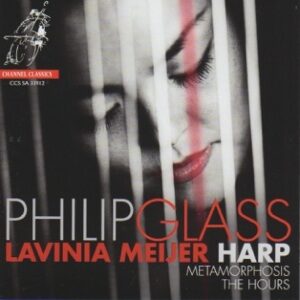If you’ve got insomnia, then this disc is for you. Philip Glass’ piano music is, how shall we say, placid at best. Arrange it for harp and it becomes positively tranquilizing. Not that this is a bad thing. Lavinia Meijer is a fabulous harpist, with a silky touch and a voluptuous timbre, and she’s stunningly well recorded in SACD surround sound (if that’s your pleasure). Besides, insomnia is serious, and it’s no insult to Meijer or Glass to suggest that this music might be put to good use, whether for relaxation or as a warm and comforting background to some other activity (a romantic dinner?).
Musically speaking all three works here sound pretty much the same: attractive sequences of chords endlessly repeated; brief melodic fragments backed by simple ostinatos; never anything disturbing. The Hours has movement titles that promise a certain level of excitement—The Poet Acts, I’m Going to Make a Cake, An Unwelcome Friend—but very little of note breaks Glass’ generally unruffled surfaces. Know what you’re getting and you’re sure to enjoy this beautifully played and recorded, if somewhat specialized, disc. Put it on and take a bubble bath.
































